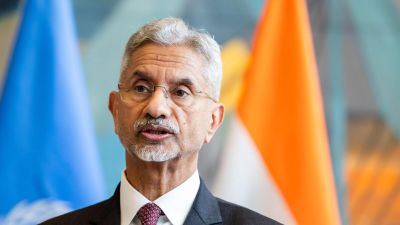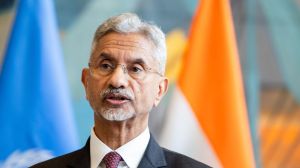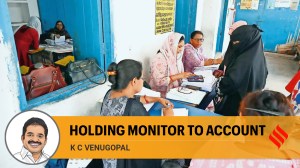Delhi HC reduces sentence of 2 women convicted for links to banned terror organisation ISKP
The sentences of Hina Bashir Beigh and Sadiya Anwar Shaikh were reduced from eight and seven years, respectively, to six years each.
 The NIA had accused Beigh of propagating objectionable ISIS materials that were used in the anti-Citizenship Amendment Act (CAA) protests for allegedly inciting Muslims to take up violence in the name of jihad and spreading hatred against non-Muslims. (File)
The NIA had accused Beigh of propagating objectionable ISIS materials that were used in the anti-Citizenship Amendment Act (CAA) protests for allegedly inciting Muslims to take up violence in the name of jihad and spreading hatred against non-Muslims. (File)The Delhi High Court on Thursday reduced the sentences of two women who were convicted of being affiliated with the banned terror organisation Islamic State Khorasan Province (ISKP) and accused of being part of a conspiracy to spread terror in India.
In May this year, a special National Investigation Agency (NIA) court in Delhi sentenced Hina Bashir Beigh and Sadiya Anwar Shaikh to eight and seven years, respectively, for offences under sections 38 and 39 (membership and support of terror organisation) of the Unlawful Activities (Prevention) Act. On Thursday, a division bench of Justices Prathiba Singh and Amit Sharma modified the sentences to six years imprisonment each.
Deciding on Beigh and Shaikh’s pleas seeking a reduced sentence, the court reasoned, “Considering the specific facts of the present cases, the proliferation of crime through the internet and social media platforms cannot be ignored. The fact that the appellants used fake identities to conceal their original identity and avoid tracing also cannot be ignored.”
“While encrypted platforms permit and encourage privacy and freedom of speech and expression, the misuse of the same by terrorists and banned organizations also would have to be borne in mind. The appellants are technologically savvy persons who have made use of their educational qualifications to promote terrorism and incite offensive activities against the country. Such cases would have to be dealt with differently than cases involving innocent persons, who may have been pulled into crime without their knowledge. Factors such as funding through bitcoins, as also the use of journalistic credentials to publish and disseminate magazines to incite violence, also cannot be ignored,” the court said.
The NIA had accused Beigh of propagating objectionable ISIS materials that were used in the anti-Citizenship Amendment Act (CAA) protests for allegedly inciting Muslims to take up violence in the name of jihad and spreading hatred against non-Muslims. Beigh allegedly also used fake identities on social media platforms to engage in “anti-national activities” and conspired to carry out terror activities in India, as per the central agency.
Shaikh allegedly enquired about suicide jackets and was part of chats with various operatives of ISIS, Al Qaeda and Answar Ghazwat-ul-Hind, as per the NIA.
In February, Beigh and Shaikh had pleaded guilty following the framing of charges by the special NIA court. After the pronouncement of the sentence on May 6, the two moved the Delhi High Court, seeking a reduction of their sentences. The two have been in custody for more than four years.
Noting that while some foreign jurisdictions such as the UK, the US and Sweden have framed policies on sentencing in case of terrorist acts, and some others have general guidelines, the court observed “no guidelines have been framed in India at a policy level”.
Relying on past judicial precedents, the court held, “While awarding sentences for terrorism-related activities, the courts will have to, not merely bear in mind the crime committed but also the impact of the same and the propensity of the person to indulge in a similar crime in future. The intent behind providing a range of punishment that could be awarded for an offence is to give the courts sufficient discretion to consider various aggravating and mitigating factors while awarding sentences. Though there is no doubt that the discretion has to be exercised judiciously, it cannot be expected to be uniform.”
“In a country like India, where there are possibilities of innocent persons being encouraged towards terrorism, it is not merely the rights of the convict that have to be considered but also the impact of the said convict being allowed to integrate back into society which has to be considered,” the court emphasised.
The court listed aggravating factors such as both women had shown active involvement with a banned terrorist organisation and the main accused, and were seen inciting violence through publications during the CAA/NRC protests while recording that given the accused two are women, “who may not be fully aware of the complete plans…could be mitigating factors”.







